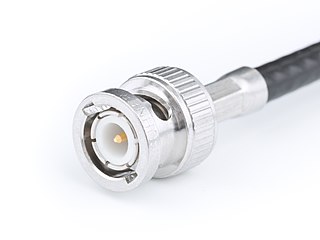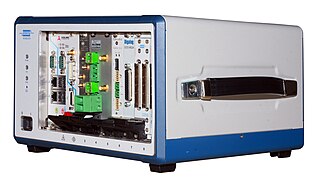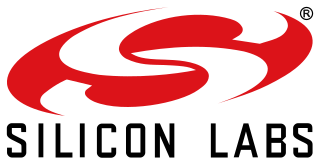A signal generator is one of a class of electronic devices that generates electrical signals with set properties of amplitude, frequency, and wave shape. These generated signals are used as a stimulus for electronic measurements, typically used in designing, testing, troubleshooting, and repairing electronic or electroacoustic devices, though it often has artistic uses as well.
Radio frequency (RF) is the oscillation rate of an alternating electric current or voltage or of a magnetic, electric or electromagnetic field or mechanical system in the frequency range from around 20 kHz to around 300 GHz. This is roughly between the upper limit of audio frequencies and the lower limit of infrared frequencies; these are the frequencies at which energy from an oscillating current can radiate off a conductor into space as radio waves. Different sources specify different upper and lower bounds for the frequency range.

The BNC connector is a miniature quick connect/disconnect radio frequency connector used for coaxial cable.

Electronic test equipment is used to create signals and capture responses from electronic devices under test (DUTs). In this way, the proper operation of the DUT can be proven or faults in the device can be traced. Use of electronic test equipment is essential to any serious work on electronics systems.

Analog Devices, Inc. (ADI), also known simply as Analog, is an American multinational semiconductor company specializing in data conversion, signal processing and power management technology, headquartered in Wilmington, Massachusetts.

The Wi-Fi Alliance is a non-profit organization that owns the Wi-Fi trademark. Manufacturers may use the trademark to brand products certified for Wi-Fi interoperability.

Nordic Semiconductor is a fabless semiconductor company headquartered in Trondheim, Norway, and focused on low-power wireless communications devices.
Teradyne, Inc. is an American automatic test equipment (ATE) designer and manufacturer based in North Reading, Massachusetts. Teradyne's high-profile customers include Samsung, Qualcomm, Intel, Analog Devices, Texas Instruments and IBM.

Automatic test equipment or automated test equipment (ATE) is any apparatus that performs tests on a device, known as the device under test (DUT), equipment under test (EUT) or unit under test (UUT), using automation to quickly perform measurements and evaluate the test results. An ATE can be a simple computer-controlled digital multimeter, or a complicated system containing dozens of complex test instruments capable of automatically testing and diagnosing faults in sophisticated electronic packaged parts or on wafer testing, including system on chips and integrated circuits.

An RF switch or microwave switch is a device to route high frequency signals through transmission paths. RF and microwave switches are used extensively in microwave test systems for signal routing between instruments and devices under test (DUT). Incorporating a switch into a switch matrix system enables you to route signals from multiple instruments to single or multiple DUTs. This allows multiple tests to be performed with the same setup, eliminating the need for frequent connects and disconnects. The entire testing process can be automated, increasing the throughput in high-volume production environments.
Advantest Corporation (株式会社アドバンテスト) is a Japanese leading manufacturer of automatic test equipment (ATE) for the semiconductor industry, and a manufacturer of measuring instruments used in the design, production and maintenance of electronic systems including fiber optic and wireless communications equipment and digital consumer products. Based in Tokyo, Advantest produces Memory, SoC and RF test systems.

PCI eXtensions for Instrumentation (PXI) is one of several modular electronic instrumentation platforms in current use. These platforms are used as a basis for building electronic test equipment, automation systems, and modular laboratory instruments. PXI is based on industry-Industry-standard computer buses and permits flexibility in building equipment. Often modules are fitted with custom software to manage the system.
Credence Systems Corporation was a manufacturer of test equipment for the global semiconductor industry, with a major focus on solving specific challenges facing the fast-growing consumer-driven semiconductor markets. Founded in 1978 by David Mees as Semiconductor Test Solutions, the company changed its name to Credence after acquiring Axiom and ASIX in 1990. The company's initial public offering was completed on October 28, 1993. It was publicly traded on the Nasdaq stock market under the symbol CMOS before the merger with LTX in 2008. It was headquartered in Milpitas, California, and was established in twenty countries.
KLA Corporation is a capital equipment company based in Milpitas, California. It supplies process control and yield management systems for the semiconductor industry and other related nanoelectronics industries. The company's products and services are intended for all phases of wafer, reticle, integrated circuit (IC) and packaging production, from research and development to final volume manufacturing.
Standard Test Data Format (STDF) is a proprietary file format for semiconductor test information originally developed by Teradyne, but it is now a de facto standard widely used throughout the semiconductor industry. It is a commonly used format produced by automatic test equipment (ATE) platforms from companies such as Cohu, Roos Instruments, Teradyne, Advantest, and others.
Rohde & Schwarz GmbH & Co KG is an international electronics group specializing in the fields of electronic test equipment, broadcast & media, cybersecurity, radiomonitoring and radiolocation, and radiocommunication. The company provides products for the wireless communications, broadcast & media, cybersecurity and electronics industry, aerospace and defense, homeland security and critical infrastructures.

Silicon Laboratories, Inc. is a fabless global technology company that designs and manufactures semiconductors, other silicon devices and software, which it sells to electronics design engineers and manufacturers in Internet of Things (IoT) infrastructure worldwide.

Keithley Instruments is a measurement and instrument company headquartered in Solon, Ohio, that develops, manufactures, markets, and sells data acquisition products, as well as complete systems for high-volume production and assembly testing.
WiFi Sensing uses existing Wi-Fi signals to detect events or changes such as motion, gesture recognition, and biometric measurement. WiFi Sensing is the combination of Wi-Fi and RADAR sensing technology working in tandem to enable usage of the same Wi-Fi transceiver hardware and RF spectrum for both communication and sensing.







